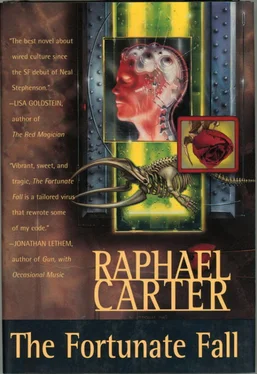Raphael Carter - The Fortunate Fall
Здесь есть возможность читать онлайн «Raphael Carter - The Fortunate Fall» весь текст электронной книги совершенно бесплатно (целиком полную версию без сокращений). В некоторых случаях можно слушать аудио, скачать через торрент в формате fb2 и присутствует краткое содержание. Город: New York, Год выпуска: 1996, ISBN: 1996, Издательство: Tor Books, Жанр: Киберпанк, на английском языке. Описание произведения, (предисловие) а так же отзывы посетителей доступны на портале библиотеки ЛибКат.
- Название:The Fortunate Fall
- Автор:
- Издательство:Tor Books
- Жанр:
- Год:1996
- Город:New York
- ISBN:0-312-86034-X
- Рейтинг книги:3 / 5. Голосов: 1
-
Избранное:Добавить в избранное
- Отзывы:
-
Ваша оценка:
- 60
- 1
- 2
- 3
- 4
- 5
The Fortunate Fall: краткое содержание, описание и аннотация
Предлагаем к чтению аннотацию, описание, краткое содержание или предисловие (зависит от того, что написал сам автор книги «The Fortunate Fall»). Если вы не нашли необходимую информацию о книге — напишите в комментариях, мы постараемся отыскать её.
“Gripping…. One of the most promising SF debuts in recent years”.
—“Publisher’s Weekly” starred review
The Fortunate Fall — читать онлайн бесплатно полную книгу (весь текст) целиком
Ниже представлен текст книги, разбитый по страницам. Система сохранения места последней прочитанной страницы, позволяет с удобством читать онлайн бесплатно книгу «The Fortunate Fall», без необходимости каждый раз заново искать на чём Вы остановились. Поставьте закладку, и сможете в любой момент перейти на страницу, на которой закончили чтение.
Интервал:
Закладка:
“Pavel Voskresenye,” I said to the blank screen, “this is Maya Andreyeva, a Camera at News One hearth. I’d like to set up—”
“Meet me in grayspace,” said a voice from the videophone, followed by the flashing message: CONNECTION BROKEN.
“Why would an old man out of the Square Miles want to meet in grayspace?” I said warily.
“Maybe he figures it’s your home turf. Maybe he remembers.”
And that was possible. Back in 2297 I covered the Binary Biodiversity Act, the law that put life into grayspace. It was an African idea: since most computers are partly idle most of the time, why not use the extra processing capacity to evolve new algorithms? The Fusion was mistrustful, naturally, but the idea was too good to pass up out of spite. So the unused space—the grayspace—on thousands of computers was stitched together into two kingdoms: moist grayspace, dry grayspace. The dry side was seeded with random code, and the moist with random neurodes.
For the first couple of years everybody was happy, and I got to say all sorts of pretty phrases about a new age of cooperation between the FHN and Africa. After all, they’d given us such a good deal: we could have anything in grayspace that we recognized as useful, and they’d have their pick of the rest. I don’t need to tell you who got the better end of that bargain. And so, instead of getting more stories on African politics, as I’d hoped, I wound up going back to grayspace every couple of months to check up on the aborigines and grouse about African trickery.
I still wonder: what did the Africans want? Were they as naive as we were, hoping for a faster sorting algorithm and better robot vision? Or did they want to fill up grayspace with feral intelligences, and if so, to what end?
“I hope I haven’t thrown out my myrmichor,” I said. But I knew just where it was, nestled in foam in a plastic box on the top shelf of the bedroom closet. The myrmichor plugs into the occipital socket, the parietal, and both temporals, so I had to take out all my other moistware, except, of course, the encyclopedia. After some fumbling I got it strapped on: a baroque headdress covering the whole back of my skull, looking like a set of external vertebrae.
“Why don’t you plug your camera chip into your wrist,” she said, “so it’ll be there if you need it?”
“What good would that do? It won’t work in my wrist.”
“I can get to it through your wrist socket and patch it back into your temporal lobe. Just in case he says something you want to catch.” As she spoke, her Word panned from slithering to hope.
“This is strictly background, Keishi. I’m not going to use it directly. No one cares what Pavel Voskresenye looks like in grayspace. What is it with you and that camera chip, anyway?”
The mask grinned. “Okay, you caught me. I was going to modernize your colors. But subtly, subtly. You would have liked the results.”
“Just leave my colors alone.”
“Whatever you say, chief.” Bolus appeared on her Word in elaborate script letters. “Are you ready?”
“Keishi, you are not going with me.”
“Oh, come on,” she said. “It’s an old dream of mine. When I was in school I glued the cover from a textbook onto my Net chip so I could watch you in history class. When the Mars landing was up against reruns of your show, I watched your show. I’ve dreamed about going into grayspace with you since I was twelve years old.”
“I was on the Net when you were twelve? Excuse me while I crawl off into a corner and decompose.”
“Oh, quit being so sensitive,” she said. “Just let me tag along. It really means a lot to me—it’s like getting a chance to ride with the Lone Ranger.”
The Lone Ranger, no less. The things a classical education does to people’s minds. I wasn’t going to have the energy to fight this out, I realized. “All right,” I said, “Just don’t get in the way.”
“Perish the thought.” Cross, said the Word.
I didn’t trust her for a second, but I said: “All right, you’ve been here more recently than I have; should I put on my shields?”
“Depends. What kind of shielding have you got?”
“I don’t know. Whatever they gave me, fifteen years ago.”
“Oh, good God. Petrov shielding? The kind without camouflage?”
“I said, I don’t know what it’s called.”
“Looks like you’re encased in a gigantic Christmas tree?”
“That’s the one.”
“Leave it off, then. It’ll attract predators for miles around. I guess you left before the aborigines discovered stealth technology.”
“Stealth? What kind of stealth?”
“Well, to begin with, you should turn the sensitivity and contrast on your myrmichor all the way up, if you want to see anything.”
“Terrific.” I hadn’t even met Voskresenye, and I was already starting to dislike him.
Take me in, I thought to the myrmichor, and it began to feed images into my optic nerve. It wasn’t loading me into grayspace yet, only sticking a periscope into it, so I could find a nice safe corner where I could upload in peace.
But everything I saw looked quiet and safe, even when I turned up the controls as far as they would go. I was using the classic interface: the size of a neurode shows how many connections it’s got; colors indicate how many times it’s fired since you’ve been watching; you blink to reset. But no matter how long I held my eyes open, and no matter how much I played with the depth of field, nothing would strobe down the spectrum to red. There were long branching synapse-chains, like veins or vines, that would slowly turn golden; drifting baleens in violet and indigo against the black; but nothing that looked capable of locomotion.
“All right, then,” I said. “Let’s do it right here.” The myrmichor touched my brain, and began to upload me.
I read somewhere that myrmichor means “being carried away by ants.” I don’t know if that’s even true, but when I hear the word I always think of a video I saw once, of an ant cutting a circle of leaf and carrying it off in her mouth; and then the camera zooms back, and you see there are a million ants, and the tree is almost bare.
It’s actually a little bit more organized than that. First the bugs divide your mind into parcels that are almost independent—I always picture paper growing up between the wrinkles of the brain, like the membrane between cloves of garlic. The ants descend on each clove in turn, carry it off to grayspace, and reconnect it. As this happens, you briefly lose certain capacities; sight, mostly—I was blind for a long time, and when the sight came back I was agnosic, and then paralyzed.
At least there was no aphasia, and no obvious loss of memory; the myrmichor only had to upload a part of my mind. In Africa, where the Net will hold souls, people upload nearly all of their brains into grayspace, neuron by neuron. In the real world, if you do that you lose your sensory qualia: colors are reduced to wavelengths, emotions become mere data, and in short, you get desouled. So we leave most of the brain in the skull, and only move the parts that need to run at Net speeds. I don’t know the details of what uploads and what doesn’t, but you can tell that some of your memories stay in the skull. If you try to remember how your breakfast looked, you can do it easily; but if you try to remember how it tasted, it seems to take hours, as if your mind had to send off to Moscow for the information. And all the while your eyes are darting around, hyper-alert to the least movement. As in a dream, where your pulse is racing but your legs won’t move at all.
Even having a little bit of your brain in the Net is an unpleasant sensation, though. You feel half dead, half petrified, as if you’d been given artificial legs. It feels—tinny, false. It’s impossible to describe. If you’ve got nanobugs in your head, try it and you’ll know. If you’ve only got an implant, then for God’s sake don’t upgrade for grayspace; it’s overrated.
Читать дальшеИнтервал:
Закладка:
Похожие книги на «The Fortunate Fall»
Представляем Вашему вниманию похожие книги на «The Fortunate Fall» списком для выбора. Мы отобрали схожую по названию и смыслу литературу в надежде предоставить читателям больше вариантов отыскать новые, интересные, ещё непрочитанные произведения.
Обсуждение, отзывы о книге «The Fortunate Fall» и просто собственные мнения читателей. Оставьте ваши комментарии, напишите, что Вы думаете о произведении, его смысле или главных героях. Укажите что конкретно понравилось, а что нет, и почему Вы так считаете.












